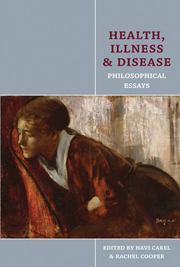Book contents
- Frontmatter
- Contents
- Acknowledgements
- Contributors
- Introduction
- Part I Concepts of health and disease
- 1 The opposition between naturalistic and holistic theories of health and disease
- 2 Health and disease: social constructivism as a combination of naturalism and normativism
- 3 Towards autonomy-within-illness: applying the triadic approach to the principles of bioethics
- 4 The concept of “mental disorder”
- Part II The experience of illness
- Part III Illness and society
- Bibliography
- Index
3 - Towards autonomy-within-illness: applying the triadic approach to the principles of bioethics
from Part I - Concepts of health and disease
- Frontmatter
- Contents
- Acknowledgements
- Contributors
- Introduction
- Part I Concepts of health and disease
- 1 The opposition between naturalistic and holistic theories of health and disease
- 2 Health and disease: social constructivism as a combination of naturalism and normativism
- 3 Towards autonomy-within-illness: applying the triadic approach to the principles of bioethics
- 4 The concept of “mental disorder”
- Part II The experience of illness
- Part III Illness and society
- Bibliography
- Index
Summary
INTRODUCTION
The notion of autonomy has been crucial in the development of bioethics and, particularly, the ethics of health care. Generally speaking, autonomy refers to the capacity of individuals to act in the world in a self-regulated way, “the having or making of one's own laws” (Oxford English Dictionary). In this sense, agents are autonomous if their actions are truly their own. In ancient Greece the term was applied to the polis, referring to the self-government of city-states; later, modern philosophy extended this to the ethical and political self-determination of human beings (Schneewind 1998). The idea of autonomy as moral freedom already appears in the writings of Rousseau and is central to Kant's philosophy, for which the autonomy of the will is a necessary condition for moral action, and the moral principles or laws that dictate how we must act originate in reason. In this sense, autonomy is understood as the capacity to act in accordance with internal norms, not controlled by others, but also as the obligation established by one's duty to consider others as autonomous beings; that is, their right to be respected as such and therefore, not to be externally manipulated (Etxeberria & Casado 2008). In the field of bioethics, most scholarship has focused on this second meaning of autonomy. In this chapter, however, we argue that the first sense of the term, that is, the capacity to be autonomous, needs to be re-examined within a naturalist approach so as to explain what it means for an agent to be autonomous.
- Type
- Chapter
- Information
- Health, Illness and DiseasePhilosophical Essays, pp. 57 - 76Publisher: Acumen PublishingPrint publication year: 2012



